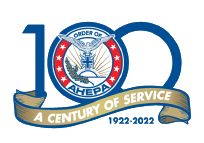History of the Order of AHEPA 1922 - 1972
Chapter Five: The Years 1931 - 1934
Page 271
The Ninth Supreme Convention
August 24 to 31, 1931 - San Francisco, California
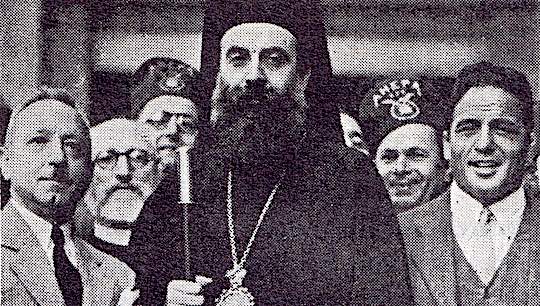
1931 - San Francisco Supreme Convention
His Eminence Archbishop Athenagoras and Jim Londos at the San Francisco convention
The Ninth Supreme Convention was held in San Francisco, California August 24-31, 1931, with 169 delegates present.
The Chapter delegates were:
George C. Cassimus and Gus L. Constantine, Birmingham; Theo. S. Zuppas, Tulsa; Jerry Galatis, Miami; John K. Douglas, Tarpon Springs; Nicholas A. Loumos, Boston; James D. Jameson, New York City; James Kontometros and Louis Peet, Houston; C. J. Coventaros, Baltimore; Soterios Nicholson and George C. Vournas, Washington, D.C.; Fred Spanos, Cleveland; D. Makris, Syracuse; George Polites, Brooklyn; George Papaeleas, New York City; D. Parry, Chicago; Alexander J. Critzas, Yonkers, N.Y.; James N. Pappas, Newark; Nick Softis and Harry Stathis, St. Louis; A. G. Angelson and August Rogokos, Paterson, N.J.; D. N. Karalis, Minneapolis; William Essaris, Wheeling, W. Va.; James Veras, Scranton, Pennsylvania; Nicholas Lambadakis, Jamaica, N.Y.; Basil C. Aronis, Warren, Ohio; Charles Stathakos, Buffalo; C. J. Thomas, Chicago; George D. Tsoulos, and G. A. Kyriakopoulos, Chicago; John Govatos, Wilmington, Del.; Constantine G. Psaki, Astoria; Peter Vanech, Stamford, Conn.; Lew Blatz, Oak Park, Ill; George P. Chacona, Erie, Pennsylvania; Anthony Laganis, Pottsville, Pennsylvania; John A. Givas, Plainfield, N.J.; Mathew Frangedakis, Lewiston, Me.; A. E. Couloheras, New Orleans; C. G. Paris, Lynchburg, Va.; N. K. Kotro-Manes and Mike Papanicholas, Salt Lake City; Chris C. Harvalis, Omaha; Chris Katon and George C. Peterson, San Francisco.
D. Sterios, Fresno, Cal.; E. J. Fostinis and John Pappageorge, Los Angeles; George E. Zamm, Sacramento, Cal.; John D. Damis and Panos Lampros, Portland, Oregon; George A. Loutas, Caspter, Wyoming; Teddy Kallis, Pueblo, Colo.; George Peterson, Grand Island, Nebraska; Sam N. Vlahos and Tom Michaels, Oakland; Robert Katson and John A. Dimmis, Albuquerque, N. Mex.; E.T. Morisse and Thomas D. Lentgis, Seattle; Nick Dougas and Christ Manthon, Tacoma; James Rizis, Aberdeen, Wash.; John Damascus and Nick Bouras, Spokane; Gust Davis, Rock Springs, Wyoming; Charles E. Rallis and George Zavos, Green River, Wyoming; William J. Pappas, Bingham Canyon, Utah; A. D. Batestas, Ogden, Utah; George Karasoulas and Nicholas Salevourakis, Price, Utah;
Page 272
Sam Bushong, Wichita, Kansas; Gust Dariotis, Sioux Falls, South Dakota; James V. Pananes, Hagerstown, Md.; Paul M. Costas, Cedar Rapids, la.; George J. Polos, Calexico, Cal.; D. G. Michalopoulos and James Kallas, Chicago; A. A. Pantelis, Evanston, Ill.; Stephen Falakos, Chicago; Theodore Daldakis, Butte, Montana; Nicholas Pappadiamantis, Ft. Dodge, la.; P. T. Kisciras, Cheyenne, Wyoming; George D. Poulos, Stockton, California; Peter Grakos, Vallejo, California; Milton Stamatis and Chris Johnson, Phoenix; George M. Poulos, Ventura, California; George M. Kalliris and Gregory Trompas, San Diego, California; James Lucas, Bakersfield, California; Edgar P. Carlton, Philadelphia, Pennsylvania; V. G. Kyriacopoulos and A. A. Angelos, Marysville, California; George N. Geranios, Great Falls, Montana; Nick Johnson, Roseville, California; Constantine A. Tsangadas, Detroit; Andrew Sanderson, Kansas City, Mo.; Constantine Stephanson, Chester, Pennsylvania;
George J. Triphon, Sacramento, California; James A. Woonas, Mason City, la.; I. A. Lougaris and William Coleman, Elv, Nevada; Andy Poulos, Dubuque, lowa; George Cordas, Boise, Idaho; Chris A. Arthunas, Eureka, California; Peter Clandinos and Angelo Pappas, Reno, Nevada; Nick Papadakis, San Pedro; Peter Boudoures and Theodore C. Andronicos, San Francisco; Gust Pantoplos, Billings, Montana; Steve Adams and Tony G. Kordopatis, Pocatello, Idaho; James Demoplos, Oklahoma City, Okla.; Louis M. Pashos and Tom Poulos, Santa Barbara; George Kounias, Modesto, Calif; Louis Frangos, San Jose; George N. Cominos and George J. Christo, Salinas, California; Jim Kelly, Boise, Idaho; George Kotosogean, Bellingham, Washington; John Papadoulis, Pittsburgh, California; Andy Poulos, Dubuque, lowa; G. Georgiades, Gallup, New Mexico.; Chris Arthimas, Eureka, California; A. C. Johns, Port Angeles, Washington; James Tousses, Sheridan, Wyoming; George Karathanasis, Everett, Washington; Evangelos Kilismanis, Toronto, Canada; Thomas Stamatis, Vancouver, Canada; Eustace Gravaris, Montreal, Canada; and George Vlasis, Regina, Canada.
Officers of the San Francisco convention elected to conduct the business sessions were James Veras, Chairman; Soterios Nicholson, Vice Chairman; and D. Parry, Secretary.
Business conducted by the convention included:
That a mutual cooperative Death Benefit Department be established at the Headquarters; That the Advisory Board of the Sons be abolished, and that all records and organization work of the Sons of Pericles be done under the direction of the Ahepa Headquarters; That the Sons of Pericles shall hold their annual conventions at the same time and place as those of the Ahepa, and that the Sons publication be abolished as a separate publication, and they be allowed certain pages in the Ahepa magazine; That the Ahepa be represented in the George Washington Bicentennial Celebration, as well as in the Flag Day Pageant to be held in Washington on June 14, 1932; That the Florida Ahepa Chapters participate in the annual Epiphany Day ceremonies at Tarpon Springs, Fla.; That new chapters could be created with a minimum of 15 members; That the Supreme Lodge officers be reduced from 18 to seven members; That 36 gubernatorial Ahepa Districts be created; That four scholarships be awarded each year; That a committee be appointed to study the proposal to erect a tuberculosis sanatorium; That an Ahepa Excursion to Greece be held in the spring of 1932; That the 1932 convention be held in Baltimore, Maryland.
Page 273
The convention spent some time in studying the Wickersham Report, recently issued. The Chairman, Wickersham, had been appointed by the President of the United States to investigate crime tendencies in America, and one of the conclusions of the report was that "the Greek element in America is criminally inclined." The convention appointed its own committee, which came out with a resolution, adopted by the convention, condemning the report as being inaccurate and untrue, and the convention action was sent to the President in the form of a resolution.
The San Francisco convention also elected the District Governors of the new 36 Ahepa Districts, who would serve in office until their respective Districts held conventions in 1932, and elect their own successors. Therefore, the first Ahepa District Governors elected were (the District number follows each name):
Matthew Frangedakis, #1; George Eliades, #2; George Cassimatis, #3; Costas Vanech, #4; Charles Stathakos, #5; George Papaeleas, #6; John Givas, #7; C. Conventaros, #8; Dr. George Paskopoulos, #9; Nick Copanos, #10; William Essaris, #11; C. G. Paris, #12; James Orphanos, #13; Dr. G. M. Saliba, #14; Peter Galatis, #15; George Cassimus, #16; George Staffens, #17; Peter Magas, #18; William Zilson, #19; Charles Shane, #20; G. A. Kyriakopoulos, #21; M. D. Konomos, #22; A. E. Couloheras, #23; Andrew Sanderson, #24; Paul M. Costas, #25; Chris Harvalis, #26; James Dikeou, #27; George Georgeades, #28; George Ellis, #29; C. E. Athas, #30; Theodore Dadakis, #31; George Tryphon, #32; S. E. Katapodis, #33; George Plastiras, #34; E. Kalismanis, #35; E. Gravaris, #36.
The New Supreme Lodge
The new Supreme Lodge elected by the convention for the fiscal year 1931-32 was:
Harris J. Booras, Supreme President;
Theodore Andronicos, Supreme Vice President;
Achilles Catsonis, Supreme Secretary;
Andrew Jarvis, Supreme Treasurer;
Soterios Nicholson, Supreme Counsellor;
C. R. Nixon, Supreme Governor;
Peter G. Sikokis, Supreme Governor.
During the following twelve months of the new administration five new Chapters were established.
An editorial by Col. Henry W. Shoemaker was published in the Altoona, Pennsylvania Tribune on July 28, 1931, "Greek Flag Familiar in Central Pennsylvania":
The presentation of a Greek flag to the Commonwealth of Pennsylvania through the intermediary of the American Legion at Harrisburg recalls the fact that the flag of Greece is and has been a familiar object in Central Pennsylvania ever since the days of Greek Independence. Fully a hundred and twenty-five years ago many Greek refugees began flocking into this state, which from the era of William Penn has been a safe harbor for the religious and political martyrs of all nations. Aaronsburg, Centre County, which had been laid out by the public-spirited Jew, Aaron Levy, as the future capital of the state, was the headquarters of these early Greek pioneers before scattering out through the country.
Page 274
It was there, in the rear of a store building, that a dais was erected, on which a descendant of Michael Angelus, Greek ruler, received the homage of her compatriots who passed through Aaronshurg to join their friends in other parts of the state.
Enthusiasm for Greek freedom ran high in Central Pennsylvania, culminating in naming a Clinton county town Salona, after Salonika in Greece. As a boy this writer always found great pleasure in talking to aged Greeks, who had come to Central Pennsylvania during the first quarter of the Nineteenth Century. All of them were great admirers of Lord Byron and aroused his youthful enthusiasm for this great poet who gave his life for Greek freedom, much as did the American poets Alan Seeger and Joyce Kilmer, in an effort to make the world safe for democracy in the Great War. Since then the writer has always had a portrait of Byron, in Albanian costume, in his study. It is the real Byron, the soldier and the patriot, and appeals to one much more than the effeminate, clean-shaven version as described by Andrew Maurois. One old Greek was fond of telling how he went to Rome, about 1824, with his parents, in an effort to secure the aid of the Pope, and how they were housed for a week or more in the Vatican. The mission failed for political reasons, and instead of returning to Greece the patriotic band took ship for Pennsylvania, eventually settling down in Sugar Valley, Clinton County.
Cincinnati, Ohio Chapter donated $500 to the local Greek school … The Ahepa Boston Patrol received another ovation for its marching at Brockton, Massachusetts in conjunction with the Brockton Chapter Patrol and the Ahepa float entered in the Brockton Fair Week parade; the Ahepans also took first place in the competition, and the press said: "The Ahepa group won their first prizes sheerly on their merits. They made a fine marching appearance and their float was very clearly the best conceived as well as the most impressively beautiful." … Governor Woodring of Kansas joined the Wichita, Kansas Ahepa Chapter, and also received an official Greek flag presented by the Ahepans, at the ceremony … The Richmond, Virginia AHEPA chapter secured a building for the use of the Church, and their own club rooms.
In The Ahepa Magazine of January, 1932, it was noted that "As the result of these pilgrimages of the Ahepa to Greece (the annual Ahepa Easter Excursion to Greece) a pronounced sentiment for America and American institutions has been implanted in the minds and hearts of the Greek people, and commercial relations between America and Greece have been considerably stimulated and augmented." … Governor Louis L. Emmerson of Illinois wrote: "Illinois is fortunate in the sons of Greece which it has attracted to its doors." … U.S. Congressman A. Piatt Andrew of Massachusetts was initiated into the Haverhill, Massachusetts Ahepa Chapter and the Haverhill Evening Gazette editorialized: "When Haverhill members of the Ahepa admitted Congressman Andrew to their organization, they paid him a distinct honor; and Andrew, by entering the Ahepa, honored the membership. An enlightened and progressive organization of rich traditions and high purposes received in its membership a man of high repute, or demonstrated ability and of true Americanism. Each, as we said, honored the other."
(Continued on page 276)
Page 275
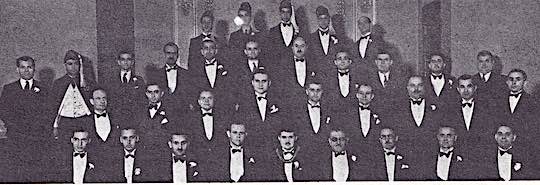
1933 - Chapter Officers Installation
Installation of officers of the Metropolitan New York City AHEPA chapters
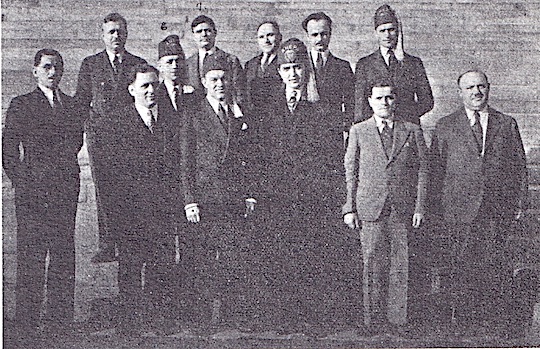
1932 - Harry Woodring
Kansas Governor Harry Woodring becomes a member of Ahepa
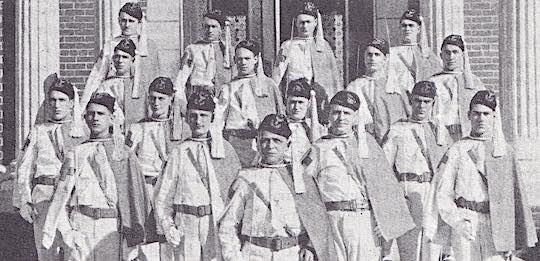
1932 - Ahepa Patrol
Ahepa Patrol of Nashua, New Hampshire Chapter #35
Page 276
(Continued from page 274)
Peoria, Illinois Ahepa chapter banquet proceeds were used to purchase food baskets for the needy of the city, and Ahepans went on a three-day rabbit hunt prior to the banquet to supply banquet food … Detroit Chapter's play proceeds were given to needy families … Philadelphia, Pennsylvania held a benefit ball for the Philadelphia Greek schools … Battle Creek, Michigan Ahepans marched in their city's centennial parade, and the local paper reported: "The striking appearance of the Greek Ahepa Order, who were marching for the first time in their new uniforms, was one of the highlights of the parade and a continuous round of applause followed their appearance along the entire line of march."
Supreme Treasurer Andrew Jarvis was elected Councilman-at-large of Portsmouth, New Hampshire by a substantial majority … The Juan de Fuca Ahepa Chapter of Seattle, Washington, sponsored an educational meeting at which Prof. Dorothea Demetracopoulos of the University of Washington lectured … City Manager C. A. Harrell of Binghamton, N.Y. was speaker at the chapter installation … Mayor W. F. Olson spoke at the Price, Utah installation … Hollywood actor and Ahepan Nicholas Dennis, in a magazine article, protests about the current (1932) trend in movies to cast the Greek-American in a bad light, as well as some newspaper stories, and particularly the movie "Yellow Ticket." … Dubuque, lowa, donated 100 food baskets to the needy … Governor Wilbur L. Cross of Connecticut attended the combined installation of the Meriden, Hartford, and New Britain chapters … Congressman Ernest W. Gibbons of Brattleboro, Vt., served as toastmaster of the Vermont Chapter banquet, attended also by Lt. Governor Williams and Mayor Perkins … Many Ahepa Chapters held celebrations this year of 1932 honoring and celebrating the 200th anniversary of the birth of George Washington … Congressman Ernest W. Gibson of Vermont became a member of the Vermont Ahepa Chapter.
Secretary of Welfare I. Albert Liveright of the Commonwealth of Pennsylvania wrote to Brother Nicholas Notarys of the Harrisburg, Pennsylvania Chapter: "In the annual report of the Eastern State Penitentiary for the year June 1, 1928 to May 31, 1929, a total population of 2,119 is reported. Of this number, 1,761 were persons born in America, and 358 were born in other countries. The number shows one citizen of Greece in this entire group."
Page 277
The Christian Science Monitor of Boston reported the following in regards to Brother John Carzis a member of the Boston AHEPA Chapter:
John Carzis, who has greatly prospered since he came from Greece some dozen years ago, is paying back his debt of gratitude to his adopted country by helping to feed its poor on Christmas and New Year's Days. Mr. Carzis, who has made his money in Boston through a chain of four restaurants, this year on New Year's Day changed that chain into harbors of practical cheer to those in need. In his restaurants he gave about 6,000 men, women and children bountiful New Year's dinners. To scores of families in Boston's West and North Ends, Mr. Carzis sent baskets brimming over with good things. America has been good to Mr. Carzis and he proposes to be good in turn to its citizens who have not prospered as has he.
… The Sons of Pericles Chapters of New Jersey and New York established their own basketball league … The St. Louis, Missouri Ahepa installation at the Jefferson Hotel was attended by 1,000 persons. The Savannah, Ga. Morning News compliments editorially the Savannah Ahepa Chapter on its essay contest for high school students on the subject "What Greece has Contributed to Civilization." … Governor George White of Ohio joins the Cincinnati Ahepa chapter.
Ahepa succeeds in deleting certain incidents and dialogue from the movie "The Yellow Ticket" which were unnecessarily critical of the Greek-American
… Flint, Michigan Chapter initiates Mayor William H. McKeighan, four time mayor of the city … New Jersey Governor A. Harry Moore attended the Jersey City Ahepa Chapter Ball as his first public appearance following election … Mayor William Ward, Jr. of Chester, Pennsylvania was speaker at the Ahepa educational meeting … Brother William Williams of Saginaw, Mich. was appointed to the city Board of Appeals.
N. J. Cotromanes was appointed city attorney of Stockton, Utah … Ted Pulopoulos of Omaha, Nebraska, received an appointment to the U.S. Naval Adacemy at Annapolis … Miss Mary Frances Stefan, daughter of Ahepan Stefan of Modesto, California, was elected as Prosperity Queen of the Modesto Prosperity Exposition … Allentown, Pennsylvania Chapter was one of the sponsors of the Greek play "Trojan Women" by Euripides at Cedar Crest College … Great Falls, Montana Chapter announced the initiation of Governor J. E. Erickson of Montana … Winston-Salem, N.C. Ahepa Patrol won honors in their local parade … Mother Lodge Chapter of the Daughters of Penelope, "Eos" of San Francisco, announced the establishment of two new chapters in Dubuque, Iowa, and Kansas City, Missouri … Ahepa celebrates its 10th Anniversary in July, 1932.
The 1932 Ahepa Easter Excursion to Greece arrived in Greece on the S.S. Byron on April 21, with Supreme President Harris J. Booras as Commander with 700 passengers. Supreme Treasurer Jarvis and Supreme Counsellor Nicholson accompanied the Supreme President on this 4th Ahepa Excursion to Greece. The Excursionists received royal hospitality from the government and people of Greece during their stay … Savannah, Georgia Chapter awarded prizes to high school students for entries in the Ahepa essay contest. … Ahepan Jim Londos, world's wrestling champion, visits the White House and President Hoover … Bethlehem, Pennsylvania Chapter awards prizes to college students for essays on Greek literature.
Page 278
Reverend Thomas J. Lacey
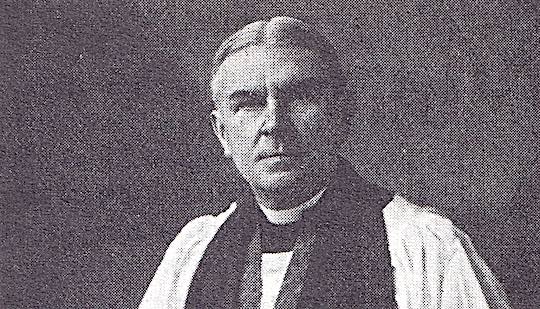
1930 - Rev. Thomas J. Lacey, Brooklyn, NY
One of Ahepa's greatest boosters and a devoted member
The Reverend Dr. J. T. Lacey was a constant booster and friend of AHEPA from its beginning, contributing many articles to The Ahepa Magazine, and visiting and participating in Ahepa functions and events whenever he found the opportunity.
Ahepa's good and close friend and member, the Reverend Dr. J. T. Lacey of Brooklyn, wrote this bit of verse for the Ahepa magazine in 1932:
I've traversed the Lackawanna,
I've pursued the Susquehanna,
But give me the good Ahepa trail.
There's a welcome from the heart
And good dinners a la carte,
For my Greek friends never fail.
The Reverend Lacey continues his article by writing:
I've been hitting the trail of Ahepa conventions, covering over 2,000 miles in a car bearing the sign 'Repeal 18th Amendment.' This is no indication of my views on prohibition. I borrowed the car and the sign went with it, giving rise to a revision of Yankee Doodle: 'A good Ahepan came to town, Ariding in a Ford; It bore a sign 'Repeal 18,' Across the running board.' Motoring in Central New York I found myself in a distinctly Hellenic atmosphere as I passed through the towns of Marathon, Delphi, Homer, Ithaca, and finally Syracuse, where the 5th District Conclave was in session. I pressed on to Ohio, reaching Middletown for the convention of District 17, where I was the speaker at the opening session. We adjourned for a picnic, where some 400 men, women, boys, and girls and babies in arms gathered for an old time frolic and partook of a fine luncheon.
On the home stretch I made three States in one day -- lunch in Ohio, supper in West Virginia and overnight in Pennsylvania, reaching Long Island for the 6th District Convention, where I delivered the invocation and participated in the great parade in a gayly decorated automobile with a group of Delphians. The town was moved and even the theatres bore the signs 'Loews Astoria Welcomes Ahepans.' Sunday found me again on the wing. I reached Scranton at night. Hellenic names gave place to titles suggesting the mining region and the stationery of Hotel Casey bore the inscription "Buy Burn Boost Anthracite." Even the Chapters in District 9 bear names suggestive of the environment -- 'Black Diamond' -- 'Anthracite' -- etc., etc. The convention was preceded by a grand initiation ceremony. Sing a song of pilgrims, Our Rector is the best; He follows the Ahepa trail, North, South, East and West.
Page 279
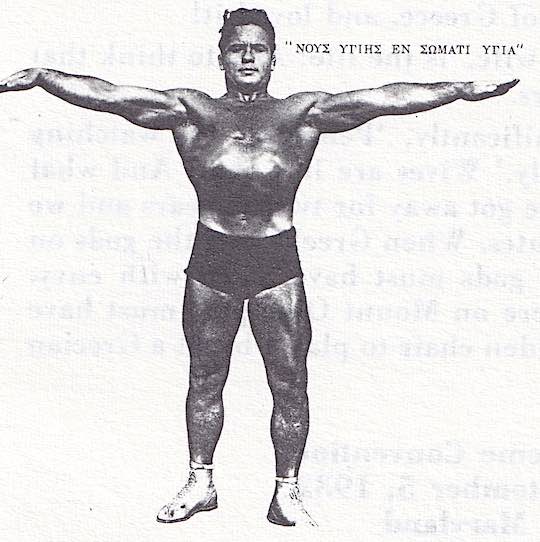
Jim Londos becomes world heavyweight wrestling champion in 1930
Jim Londos was born Christos Theofilou in 1894 in Koutsopodi, Argos, Greece as the youngest of thirteen children of Theophilos and Maria. Before arriving in the United States, in his native Greece young Londos was a shepherd. His father, Theophilos was an amateur wrestler of considerable reputation, and is credited with having instructed his young son in some of the fundamentals
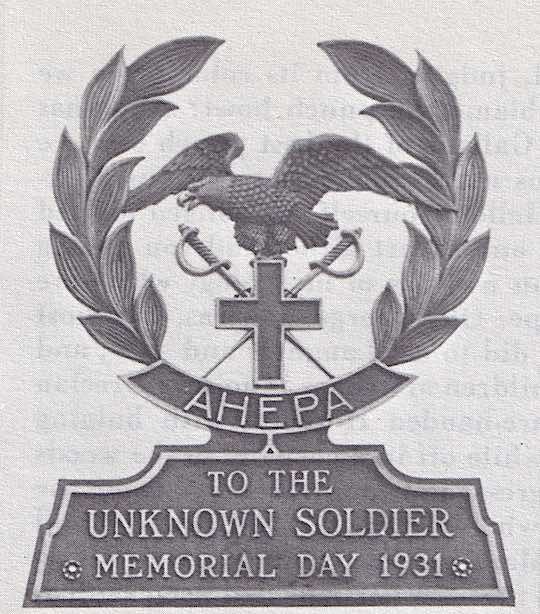
Ahepa Tomb of Unknown Soldier Bronze Tablet in Arlington Cemetery museum
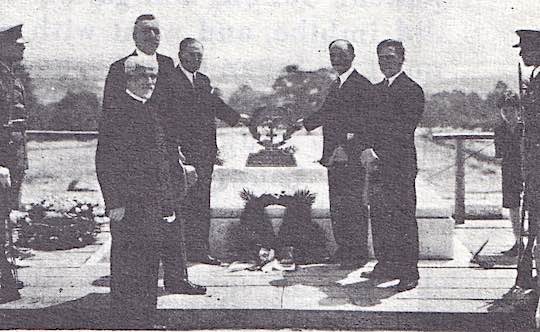
1931 – Ahepa ceremony at Tomb of Unknown Soldier
Rev. Papanicolaou, Simopoulos, Nicholson, Phillies, Catsonis
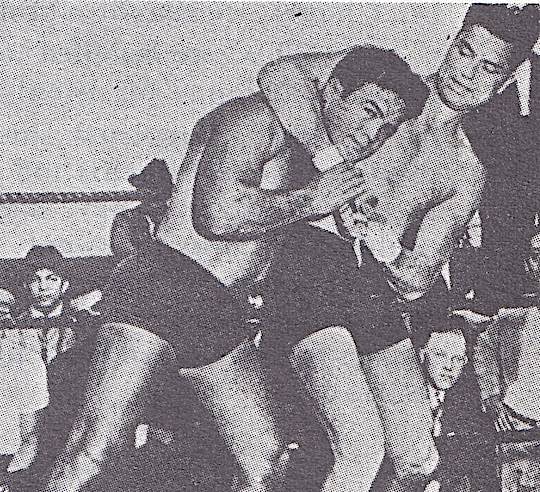
Jim Londos & Jack Dempsey
Two Ahepans, world champions Jim Londos and Jack Dempsey, posing for photographers
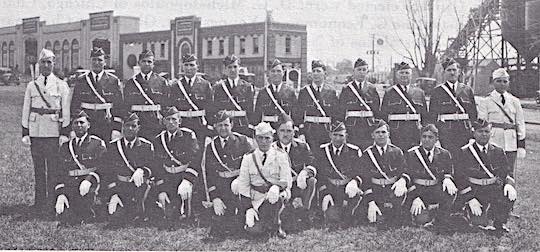
1932 - Ahepa Patrol
The Ahepa Patrol of Washington, DC Chapter #31 in 1932
Page 280
(Continued from page 278)
The newspaper, Wyoming Eagle, carried a description by staff writer J. B. Snow in the summer of 1932 of the picnic given by the Ahepa Chapter of Cheyenne, Wyoming, a part of which is reprinted here:
It was a Greek picnic, with the Cheyenne-Laramie Chapter of the Order of Ahepa as the host. Out in the wooded domain of Helge S. Sture-Vassa, Greek people of Cheyenne and Laramie ate, drank and danced in the land of the Viking. Barbecued chicken, barbecued lamb, barbecued young pig. Even the knob on the end of our nose appeared to have been barbecued, judging from its color when we returned to town. Or should we blame the punch bowl? Ah, what punch! Gallons and gallons of it. Gallons of the best punch ever we did imbibe, and what with various other things that glorious afternoon we began to feel somewhat Hellenic ourselves and longed to shed our clothing and our avoirdupois and cavort hither and yon among the trees as did once those Grecian nymphs of mythology who were wont to haunt the Vale of Tempe. Oh, George Kisciras, our hostextraordinary, just look what you did to us! Laughter and song, and over there a little group of these children of Athens is doing a Grecian dance, and somewhere else a bare-handed Hercules with bulging muscles is pulling a chain apart, while off in a clearing in the woods there is a wrestling match in progress, and soon there will come the foot races. Oh, Pheidippides, you who were the greatest runner of all the ancients, you who ran from Marathon to Athens nearly twenty-four hundred years ago with news that the Persians had been routed, how you would have loved to have seen those races! Here, for a few brief hours, we caught a glimpse of Greece, and loved it!
'This,' we bubbled to the wife, 'is the life! And to think that Ulysses left home for twenty years.'
'Perhaps,' suggested she significantly, 'Penelope was watching the liquid refreshments too closely.' Wives are like that! And what a man Ulysses must have been. He got away for twenty years and we couldn't get away for twenty minutes. When Greeks met the gods on such occasions as these, how the gods must have paled with envy. How Zeus, enthroned way up there on Mount Olympus, must have longed to come down from his golden chair to play a bit at a Grecian festival!"
The Tenth Supreme Convention
August 29 - September 5, 1932 - Baltimore, Maryland
The fraternity's Tenth Supreme Convention was held in Baltimore, Maryland during the week of August 29 - September 5, 1932, and the Convention Officers elected were: D. G. Michalopoulos of Chicago, Chairman; Constantine G. Economou of Youngstown, Ohio, Vice Chairman; and James Apostolakos of Newark, N.J., Secretary.
Delegates to the Convention were:
Supreme Lodge Officers Harris J. Booras, Theodore C. Andronicos, Achilles Catsonis, Andrew Jarvis, Soterios Nicholson, Peter Sikokis, and C. R. Nixon.
Mother Lodge Members Nicholas D. Chotas, James Campbell, Harry Angelopoulos, George A. Polos, and John Angelopoulos.
Past Supreme President George E. Phillies.
Page 281
Chapter Delegates:
James Chieflakos and James Campbell, Atlanta; Dave Karnazes, Charlotte, N.C.; Andrew Lamas, Savannah; Speros Zepatos, Memphis; Jerry Galatis, Miami; Victor H. Semos, Dallas; James T. Thomas, Boston; Ulius L. Amoss and Polydore Giovani, New York City; Marios Chios and George Polos, Philadelphia; Nick Madinos and C. J. Coventaros, Baltimore; George Thomaides and Peter D. Chipouras, Washington, D.C.; James Orphanos, Winston-Salem; George Dracon, Cleveland; Nicholas Anagnos, Syracuse; George P. Thompson, Brookline, Mass.; Constantine Tsangadas and Charles H. Diamond, Detroit; Menelaos Constantinides, Brooklyn; George Papaelias and James J. Garis, New York City; Vasilios A. Vasiliou, Manchester; D. Parry, Chicago; C. J. Critzas and Andrew M. Ellison, Yonkers; Peter N. Kitsos and James Apostolakos, Newark; John Karzin and C. B. Johannides, St. Louis; Andrew C. Angelson and John Vasiliou, Paterson, N.J.; Andrew Nickas, Canton, Ohio; George Fullas and Peter Nicas, Allentown, Pennsylvania; George Thomas and George Paskopoulos, Reading, Pennsylvania; James Alexander and Nick Notarys, Harrisburg, Pennsylvania; Anthony Cambanes, Bethlehem, Pennsylvania; William Essaris and Peter Papamichael, Wheeling; Costas Theodorides, Camden, N.J.; Soterios Lagges and Peter H. Stathopoulos, Lancaster, Pennsylvania; Mike Nickles, Trenton, N.J.
Demetrius Comuntzis, Sunbury, Pennsylvania; Chris Nicholas, Binghamton, N.Y.; Parasco E. Volo and John Lincoln, Gary, Ind.; A.G. Capourelos and Andrew Varikis, Chester, Pennsylvania; Michael Vamvas, Worcester, Mass.; S. S. Spathey, Richmond; James Veras, Scranton, Pennsylvania; James Mazarakos, Springfield, Mass.; Christos Katis, Jamaica; Peter Askounis and John Boroviles, New Castle, Pennsylvania; Basil C. Aronis and Jim Morris, Warren; Constantine G. Economou, Youngstown; George Panasis and Charles Gregory, Danbury, Conn.; James Conomis, Buffalo; Arthur H. Peponis, Chicago; D. G. Michalopoulos, Chicago; John Govatos and G. Kremedes, Wilmington, Del.; George E. Johnson and John Pappadopoulos, Astoria; James Carson, New Haven; Angelo N. Caras and Peter Maryanopoulos, Stamford, Conn.; George Eliades, Lowell; Peter G. Samaras, Weirton; A. N. Collias, Oak Park, Ill.; Louis Tsingardas, Marlboro, Mass.; E. G. Vaffeus, and John Callas, Jersey City; Thomas Christos, Pottsville, Pennsylvania; George Poole, Elmira, N. Y.; George Steffens, Dayton; John A. Givas and Michael J. Loupassakis, Plainfield, N.J.; Peter Bekeros, Newburgh, N.Y.; Louis G. Caralis, Uniontown, Pennsylvania; Thomas Fisher, Toledo; Paul Veonas and Peter Forchas, Norfolk, Va.; Louis Passalis, Schenectady; Gabriel Caracostas, Meriden, Conn.; Christ P. Harritos, Cincinnati; Mathew Frangedakis, Lewiston, Maine; George Contos, Joliet, Ill.; Jimmy Rantis, Bluefield, W. Va.; George Nicolaides and Constantine Pelias, New Orleans; C. G. Paris, Lynchburg, Va.; William Petrakis and Theodore Pekras, Columbus; Harry Morris, Utica, N.Y.; Peter Jevas, Lorain, Ohio; Elias Kampuris, Denver; P. S. Marthakis and C. E. Athas, Salt Lake City; Tom Kademenos, Yorkville, Ohio; George C. Peterson, San Francisco; George Aposporos and George Chamuris, Poughkeepsie; George Metropoulos, Detroit.
Page 282
M. Moschides, Atlantic City; Nick Nichols, Freeport, N.Y.; Alex Pavellas, Oakland; Robert Katson, Albuquerque; Paul Pappas, Green River, Wyoming; V. I. Chebithes and Aleck Cootsis, New York City; Albert Offenstein, Wichita, Kansas; James Corisis, Sioux Falls, S.D.; Tom Rallis and John Zanios, Des Moines; James Pananes, Hagerstown, Md.; Aristides Palaynes, Grand Rapids; Theologos Kalpakis and Paul Kare, Chicago; Frank Pofanti, Chicago; George Poolitsan, Middletown, Ohio; Thomas G. Cambor, Cheyenne, Wyoming; Emanuel Garvilis, Portsmouth, N.H.; Panos Dadiras, Waukegan, Ill.; Mitchell Karomfily and Basil Milionis, Philadelphia; Peter Boudoures, San Francisco; George C. Vournas and Peter Kreticson, Washington, D.C.; James Demoplos, Oklahoma City; M. G. Koumas, and Nick Zomphlis, Newport News, Va.; George L. Pappas, Rutland, Vt.; Nicholas H. Colovos, Dover, N.H.; John Panagiotou, Greensboro, N.C.; John Costovetes, Chicago; George Georgiades and Peter Libek, Gallup, N. Mex.; A. L. Peters, Tucson; Phidias Pallis and Andrew Fillias, Elizabeth, N.J.; Steve Changaris, Durham, N.C.; Jean M. Kossarides, Hackensack, N.J.; Thomas Nichols and George Pappas, Annapolis, Md.; Kenneth J. Doukas, Perth Amboy, N.J.; Panagiotis Exacoustos, Toronto; Nicholas Kerry, Montreal; and George Plastiras, Edmonton, Canada.
There were 168 total delegates in attendance at the 1932 Supreme Convention in Baltimore. Among the accomplishments of the Baltimore Convention were:
Appropriation of monies for the Scholarship Fund; $5,000 donation to the Hellenic Institute sponsored by His Eminence Archbishop Athenagoras of North and South America; donations to Tuberculosis Relief, the Sons of Pericles, a specific scholarship of $500 to Peter Demas, and a $3,000 loan to the Detroit Chapters. Legislative action of the convention included: Revision of the Ahepa Districts; a $3.00 Per Capita Tax per member which included a $1.00 allocation to the national magazine, The Ahepa; that non-salaried Supreme Lodge officers could not succeed themselves in office; That Supreme Conventions would only be held once in every two years; Increased the term of Supreme Lodge Officers to two years; and selected the city of Columbus, Ohio as the site of the next Supreme Convention in 1934.
The newly-elected Supreme Lodge officers elected for a two-year term were:
Harris J. Booras, Supreme President; P. S. Marthakis, Supreme Vice President; Achilles Catsonis, Supreme Secretary; George L. Pappas, Supreme Treasurer; George C. Vournas, Supreme Counsellor; C. E. Athas, Supreme Governor; and Robert Katson, Supreme Governor.
Economic depression which engulfed the entire country led the new Supreme Lodge to make several decisions concerning debts, and these included the cancellation of all debts owed by members to their chapters for delinquent chapter dues; cancellation of debts owed by the Chapters to the Supreme Lodge, if chapters were unable to meet them; and the offering of complete Reinstatement back into the fraternity for suspended members upon payment of only $1.00; and a reduced initiation fee for membership of only $10.00 per member for newly-initiated members. During the two following years (1932-33 and 1933-34) twelve (12) new chapters were added to Ahepa rolls.
Page 283
The Wickersham Report and Greek Criminality in the United States
Thorough Canvass of State Prisons -- Forty-four States and District of Columbia. Greek Criminality Shown to be Minimum.
By N. J. Cassavetes (September-October, 1932 Issue of The Ahepa Magazine)
(The Wickersham Committee Report on crime in the United States, published in 1931, created a furor among the Americans of Greek descent because of certain allegations and statistics concerning criminality among Greek-Americans. The author remembers the report as a topic of discussion at home, and in meetings between Ahepans in 1931 and 1932. The report seemed so erroneous, and its conclusions so far fetched to Ahepans everywhere, that committees were appointed in every State to conduct their own investigations, and other Greek-American associations also participated in the work. The following article is the result of those investigations.)
Last year, the well-known Wickersham Committee, appointed by President Hoover to investigate the Prohibition Enforcement issue and the causes of the rising criminality in the United States, reported that in general the criminality percentage among the alien born is smaller than among the native born white population of the country and that the Greek criminality percentage was 777 per hundred thousand population or a total of 7,770 Greek criminals on a total Greek population of about 1,000,000.
The Greek Patriotic Committee, an organization established for the purpose of disseminating information about Greece and the Greeks in the United States, believing that the percentage attributed to the Greeks by the Wickersham Committee was altogether exaggerated and that the Committee committed an error, requested its State representatives to canvass the State prisons in their respective States as to the number of Greek prisoners commilled for crimes and report their findings.
After nearly seven months of diligent work on the part of the 48 State chairmen of this committee, official reports have been concentrated from 44 States and the District of Columbia and the total figure of Greeks committed to Stale prisons in 44 States and the District of Columbia does not exceed 265 for the three years, 1929, 1930 and 1931.
The report for each State is as follows:
Alabama, Dr. D. Issos, Chairman: The warden of the State of Alabama writes that the State records show criminality only for two classes, whites and negroes and not by white nationalities.
Arizona, Thomas Katsenes, Chairman: The report of the chairman of the Board of Pardon and Paroles, Phoenix, Arizona, writes among other things: 'In my experience of nearly eight years in office, I can only remember two or three cases of men born in Greece being convicted. I am certain the percentage is less than one-third of that figured by the Wickersham Commission for Arizona.'
Arkansas, James Dikes, Chairman: No Greek prisoners.
California, Theodore Andronicos, Chairman: The report of the State warden advises that the total number of Greeks convicted in the Stale of California for crime during the last three years has been only 12 out of a total number of 5,000 prisoners.
Colorado, James Dikcou, Chairman: Report obtained by courtesy of Achilles Catsonis, Supreme Secretary, Order of Ahepa The warden reports: 'Average number of prisoners 1,100 for the years 1929, 1930 and 1931. Total number of Greek prisoners 2, 1 for murder, sentenced to 7 years imprisonment and the other for violation of the Volstead Act, sentenced for 1-1/2 years.'
Connecticut, Sam G. Kolias, Chairman: Report of the Stale prison warden advises that the total number of prisoners as of October 1, 1931, 728, Greeks 3.
Delaware, John Govatos, Chairman: The Delaware State report reads as follows: 'Total number of inmates in the Stale prison of Delaware for 1930, 1931-2,930 and 3,454 respectively. Greeks: None for 1930; 3 for 1931 for the following crimes: 1 for issuing worthless checks; 1 for reckless driving; 1 for trespass.'
District of Columbia, Achilles Catsonis, Chairman: The report of the superintendent reads: 'Total number of prisoners 1929-439; 1930-580; 1931-752; and fiscal year ending June 1932, 853. Total number of Greeks 6, for the following offenses: manslaughter 1 (paroled); narcotic 2 (both paroled); assault with dangerous weapon 1 (paroled); auto theft 1 (paroled); and for gaming 1.'
Page 284
Florida, George Smilzes, Chairman: The report states that there are no Greeks in the State of Florida prisons at present, and that during the last 18 years there have been imprisoned in all, 15 Greeks for breaking and entering, assault to commit a statutory offense, grand larcency, and forgery.
Georgia, Augustus Constantine, Chairman: The report for the State of Georgia is: 'None in the State prisons; in the Federal prison al Atlanta, Ga., for counterfeiting 2, for violation of the Drug Act 9, for murder 1, for violation of the Banking Act 1, for violation of Postal Laws 1, for violation of the Volstead Act 5, all others 1, or total 20."
Idaho, George B. Karaboyas, Chairman: Total number of prisoners 1930-1931-335, Greeks 1.
Illinois, George Porikos, Chairman: Report obtained by courtesy of Achilles Catsonis, Supreme Secretary, Order Ahepa, and is as follows: 'Illinois Stale Prison, Joliet, Ill.: Total prisoners 1930 -- 4,676, Greeks 30, 1932 total prisoners 4,881, Greeks 33.'
Southern Illinois Penitentiary: 1930 total number of prisoners 2,174, Greeks 1, for robbery while armed with dangerous weapon; 1931, Greeks 2, robbery and crime against nature.
That is, total Greek criminals in the State of Illinois, average 33.
Kansas, Sam Bushong, Chairman: The Attorney General advises that the State of Kansas keeps no records of prisoners by nationality.
Kentucky, Louis P. Maniatis, Chairman: The report of the Commissioner of Public Institutions states: 'Population at the Kentucky State Reformatory on October, 1931, was 2,431. Greeks 1, sentenced to 10 years for voluntary manslaughter. On October, 1931, total number of prisoners 1,115, Greeks 1, for 15 years for attempted rape.'
Louisiana, C. Pelias, Chairman: The report of the general manager of the State prison is as follows: 'Total number of convicts 1930-2,428, Greeks 2, born in the United States and committed for larceny, 1931 total, number of prisoners 2,756, Greeks, the same, 2.'
Maine, Nicholas Harithas, Chairman: The warden of the Stale writes that there have been no Greek convicts in the State of Maine for the years 1930 and 1931.
Maryland, C. Coventaros, Chairman: The report of the State of Maryland reads: 'Total number of Greek convicts 8, as follows: murder 1, shop-lifting 1, driving while under the influence of liquor 1, assault and battery 1, for disturbing the peace 1 (1 month); assault on officer while under the influence of liquor 1; carrying dangerous weapon 1 (1 month); for violating Immigration Act 1.'
Massachusetts, George Demeter, Chairman: The Deputy Commissioner, Department of Correction, writes: 'We have never secured any figures on the number of persons of Greek ancestry in our prisons or courts. You will find if you consult the annual reports of this department, a table showing nativity of prisoners and parent nativity, but the Greeks have been in such small numbers that they have always been classed under 'All others.’
Michigan, Charles Diamond, Chairman: The reports from the various State prisons of the State of Michigan are as follows:
First, Michigan State prison: 1 attempted rape; 1 statutory rape; 2 robberies, armed; 1 offering a bribe; 1 attempt to commit arson; 1 indecent liberties: 1 robbery, not armed; 2 violation liquor laws; 1 receiving stolen property; 1 gross indecency; 1 robbery, armed; 1 robbery, armed; 1 robbery, nol armed; 1 breaking and entering, night; 1 removing contract property; 1 assault to do great bodily harm.
Second, Michigan Reformatory: 'We have no native-born Greeks in this institution.'
Third, Pardon and Parole Division, Lansing, Mich.: 'Total number of Greek prisoners in the Marquette Prison 6, for murder 4, for robbery, armed, 2.'
Fourth, Detroit House of Correction: 'Total number of Greek criminals 1, breaking and entering, night. Total number of cases of misdemeanor 26.'
That is, total number of Greek criminal cases in the State of Michigan, 26.
Minnesota, S. A. Zacher, Chairman: Three Greek criminals.
Mississippi, A. K. Dinas, Chairman: The secretary of the Mississippi State penitentiary writes that there has not been even one Greek in the State penitentiary of that State during the last ten years.
Page 285
Missouri, Courtesy of Achilles Catsonis: Supreme Secretary, Order of Ahepa The report of the warden of the State Penal Institutions reads: 'As of December 31, 1930, there were 4,311 inmates confined here and as of December 31, 1931, there were 4,577. Of these our records show that only two Greeks were admitted into this institution, of which one sentenced to 2 years for arson, and the other 4 years for grand larcency.'
Montana, Gus Marinos, Chairman: 'We find that we have three Greeks in our institution, two for murder and one for grand larcency. The Warden.'
Nebraska, Christ Harvalis, Chairman: The report of the Stale prison warden is: 'In 10 years we have had only two Greeks in our prison, 1 for forgery and the other for chicken stealing.'
Federal prisoners 4, for operating a still and convicted for 1 year.'
New Jersey, John Givas, Chairman: The principal keeper of the New Jersey State prison writes: 'Greek convicts in our State prison, 1930 was 6, and in 1931 three additional, or a total of 9 convicts.'
New Hampshire, Philip Stylianos, Chairman: Greek convicts 2.
New Mexico, Robert Katson, Chairman: Reports from all the clerks of the counties have been received and in all reports it is stated that during the last eight years there is no record of Greek crimes, or civil actions, or misdemeanors.
New York, N. J. Cassavetes, Chairman: Report obtained by courtesy of Nicholas Mousmoulis, President, Aldos Club. Attica Prison 8, Auburn Prison 4, Clinton Prison 9, Great Meadow Prison 5, Sing Sing Prison 16, Elmira Reformatory 1, Naponoch 3, Matteawan State Hospital 6, Dannemora State Hospital 3. Total 55.
The crimes are as follows: manslaughter 4; murder 3; robbery 4; assault 8; other crimes 36.
North Carolina, James Orphanos, Chairman: The superintendent of the State of Carolina Prison writes: 'As superintendent of the State prison for more than 10 vears, I can say that during that period there have been only three Greeks committed to the penitentiary, to my knowledge. During this period there has been a total of 8,559 commitments to the State prison. This should serve to some extent as a barometer of the percentage of Greeks committed in North Carolina. I might also say for your information that three Greeks committed have made excellent prisoners, all have eventually been promoted to the honor grade prior to discharge. As a whole, I have always found the Greeks to be a very law-abiding and patriotic group of citizens and loyal to their friends.'
North Dakota, Peter Zappas, Chairman: The report of the secretary of the State prison slates that there has been only one Greek committed to the State prison of the State of North Dakota, sentenced to three years on a charge of immorality.
Ohio, John Fundas, Chairman: The warden of the Ohio Stale Penintenliary states: 'On November 30, 1931, the total number of Greek men present in the institution was 17 out of a total of 4,476 men.'
Oregon, James Faturos, Chairman: The report of the State prison warden slates: 'Four prisoners out of a total of 911 claimed to have been born in Greece, and these four were received on crimes of larceny.'
Pennsylvania, Nicholas Notarys, Chairman: The secretary of welfare for the State of Pennsylvania writes: 'During the six months, from April to September, inclusive, of 1931, there were 1,157 commitments to the Stale penal and correctional institutions. Of this number 6 were listed as Greeks by nationality. Four of these were committed for the Eastern State Penitentiary at Philadelphia, one to the Western Stale Penitentiary at Pittsburgh, and one to the State Industrial School at Huntington. In the annual report of the Eastern State Penitentiary for the year June 1, 1928 to Mav 31, 1929, only one Greek is reported as committed'
South Carolina, Panos Pappafilippou, Chairman: The attorney general's report reads: 'Our State criminal statistics show only whether a defendant is a white or a negro.'
South Dakota, George A. Stephano, Chairman: The office deputy of the State sheriff states: 'There is no bureau in this State that could furnish information as to Greek or other racial convicts in our State prison. It is very rare that a Greek is confined in our institutions.'
Page 286
Rhode Island, George Cassimatis, Chairman: The warden of the Rhode Island State Prison reports: 'We have 18 inmates of Greek nationality in our State prison on a total population of 790.'
Tennessee, George Cotros, Chairman: The State warden advises: 'According to a check of our records, there are not now any prisoners of Greek birth confined in this prison.'
Texas, John Voyadjis, Chairman: Total number of prisoners 5,385, Greek 1, for murder.
Utah, P. Marthakis, Chairman: The report of the clerk of the Utah State Prison reads: 'Please be advised that of 301 inmates incarcerated at the present date, we have only one man who reported that he was born in Greece.'
Washington, P. G. Kassavetis, Chairman: The following reports were received from the two State prisons in the State of Washington:
1. Washington State Penitentiary: "We have begun keeping statistics only since March, 1931, and since then and during the rest of the year the total number of convicts admitted in our institution is 123, but we have no record of any prisoners of Greek origin.'
2. Washington State Reformatory: 'A check of our records of 1931 fails to disclose where any Greeks were received here during that period.'
Virginia, Rev. S.S. Spathey. Chairman: Greek convicts in the State prisons of Virginia for the year 1931 were three adults, of whom two for murder, and three minors for waywardness.
West Virginia, J. H. DeMetro, Chairman: The warden of this state writes: 'This institution has never at any time had many Greek prisoners -- in fact there is only one at present, our of a population of approximately 2,600.'
Wyoming, George Kisciras, Chairman: The secretary of the Board of Charities and Reform and Board of Pardons of the State of Wyoming advises: 'We know that it will prove of especial interest to you to be advised that of the 58 foreign born prisoners now on our records, not one is a native of Greece. Practically every other country of Europe is represented, so we feel the factual information and data as recently assembled here in this office is a real tribute to the type of citizenship being established by those of Greek nativity who have come to Wyoming to make their home.'
Nevada, I. A. Lougaris, Chairman: The warden writes to Mr. Lougaris: 'You will kindly be advised to the effect that there is no classification of descent of the inmates kept in this office and therefore I am unable to furnish the authentic information desired. I would make a rough estimate of approximately 10 for each year.'
And Mr. Lougaris writes: 'I feel that this information of Warden Penrose is very exaggerated, or is probably mistaken. This writer lived in Carson City from 1920 to 1927 and from 1927 to the present time in Reno, Nevada. I am therefore a little familiar, as attorney with the penal institution of this State and venture to stale that there have not been more than four or five at most criminals of Greek descent during the years 1930, 1931.'
Oklahoma, C. R. Nixon, Chairman: The clerk of the Oklahoma State Penitentiary writes: ‘We beg to advise you that we have no record of any Greeks having been incarcerated in this institution during the past three years. The average population for the years 1929-32, 925; 1930, 3,000; 1931, 3,200.'
From the official records of the wardens of the Stale prisons of 44 States and the District of Columbia it appears that the total number of Greek prisoners committed for crimes of various kinds for the years 1930, 1931 and part of 1932 has been only 265, and in some instances figures cover 10 and 18 years' records of commitments or Greek convicts.
The States from which we have not been able to obtain statistics on Greek criminality are, Vermont with a very small Greek population, Indiana, Wisconsin and Iowa. If we attribute to these four Stales the high number of Greek criminality, of 35, we shall have a maximum number of Greek criminals in the 48 States and the District of Columbia of 300.
The conservative estimate of the total Greek population in the United States born in Greece is about 800,000.
Page 287
It results therefore that the maximum Greek criminality in the United States, including criminals not reported in the four States mentioned, and also in certain other Federal prisons from which we have not obtained reports, would be only 40 criminals per 100,000 population and not 777 Greek criminals per 100,000 population as erroneously reported by the Wickersham report.
This tremendous difference tends to show how superficially some official committees work and what damage can be done to the reputation and standing of foreign groups by careless investigations and reckless generalizations.
We feel deeply indebted to the wardens of the 44 States who were so good to go into the trouble of checking up their prison records, a work that oftentimes has required weeks of research to gel the figures for us.
We also desire to make public acknowledgment of our indebtedness to the 48 chairmen of the Greek Patriotic Committee, most of whom are members of the Order of Ahepa and a number of them of the Order of Gapa, for the trouble into which they have gone and the time and the expense incurred by them in order to obtain authentic figures for their respective States and to enable us to clear the name of the Greeks in the United States from the stigma of excessive criminality placed upon them by an official committee appointed by the President to report on the criminality situation in this country.
We are certain that both the Greeks in America and the people of the 48 Stales will feel gratified to learn that the Greeks fall in the class of those races that have the smallest percentage of criminals, and that they are splendid and loyal citizens of the Republic and are law-abiding, peaceful and constructive elements."
An earthquake at Chalkidiki, Greece, in the late summer of 1932, prompted the Supreme Lodge to immediately forward $1,500 for relief, to the Greek government. Governor Albert C. Richie of Maryland became a member of the Ahepa during the week of the Baltimore convention … James A. Veras was elected permanent Chairman of the Dunmore, Pennsylvania Chamber of Commerce … Ventura, California Ahepa Chapter float won the sweepstakes prize in the city's parade, with a representation of Betsy Ross making the American flag. ... Dubuque, Iowa won a prize with its float entitled Patriotism . ... Gregory Baltas was elected Commander of the American Legion Post in Hammond, Ind., and also vice president of his Ahepa Chapter.
President Roosevelt
Governor Franklin Delano Roosevelt of New York, member of Ahepa Chapter #25 of New York City, was elected President of the United States and sent the following message to the Supreme Lodge:
Those enthusiastic messages of good will touched me deeply. It is my earnest wish that I may always deserve the confidence which you have shown in me. I shall look to you and to all my fellow citizens for support and counsel during the days that are to come.
During the year of 1932, Ahepa Scholarships were awarded to the following students: E. J. Demas, New York City; Spirros P. Sarris, Lowell, Mass.; Anthony Andrutsopoulos, Canton, Ohio; Nicholas Argyr, Pueblo, Colo.; Nicholas Chaltas, Buffalo, N.Y.; Helen Collis, McGill, Nev.; Theodore F. Constant, Norfolk, Va.; Kirnon Friar, Forest Park, Ill.; Alexander Georgacopoulos, Milwaukee; Vera George, South Bend; Gregory C. Hoot, Newport, R.I.; Anthony G. Kapourelos, Chester, Pennsylvania; Takis Katsoulis, Seattle; George Lampropoulos, Pawtucket, R.I.; Nicholas Logothets, Newport, R.I.; Manuel Mamalakis, Savannah; Nick Papadionysiou, Weirton, W. Va.; Nicholas J. Pappas, Atlanta; Constantinos Pavellas, San Francsico; Harry S. Perdikis, Lawrence, Mass.; Paul Prodis, New York City; James G. Rizos, Roanoke, Va.; George Sotirion, Chicopee, Mass.; George Stavropoulos, Salt Lake City; Chris J. Tsenes, St. Louis; John N. Valianos, San Francisco; William J. Vasiliou, Poughkeepsie; William Vlackoulis, Brooklyn.
Page 288
Editorial in the Salt Lake City Telegram, August 16, 1932, with the title "Making Better Citizens":
In these days when much attention is being paid to organizations fostering destructive programs, other programs looking to the preservation of American institutions and the building of better citizenship are often overlooked. The fact that a few radical agitators could plant a ferment among World War veterans and with the aid of self-seeking politicians bring about the creation of the bonus army is an indication of the need for activity that will blight the efforts of agitators who would tear down the social system. The foreigner in America does not always receive full justice. Too often the foreigner is held up as an unwanted and an unwholesome element of society. The District Convention of the Order of Ahepa held here served to bring out into the sunlight a fraternity of citizens of Greek origin which is doing much to build and strengthen the Americanism of its own members and to set an example to other citizens who sprang from alien soil.
George Eliades, president of the Ahepa chapter in Hopewell, Virginia, was also elected president of the Hopewell Kiwanis Club
Ahepans of Missoula, Montana visited the Missoula Masonic Lodges on Jan. 17 and presented a program. Tom Duncan of the Masonic Order wrote:
If all the people who have come to the United States had tried to become half as good citizens as have the Greeks, much of the social friction evidence in the past would have been avoided. It is hoped that more Americans can know of the work Ahepa is doing, for in that knowledge comes the undeniable realization that Ahepa is an organization working and striving unselfishly for the good of America and her people. Because Ahepa is helping the Greeks who have come to America, to become Americans it is doing more than can be said of any other organization in any other group. Our hats are off to Ahepa, and its members, for in that organization is a symbol of progress and right living.
Six hundred needy people were fed in their restaurants by Peter and John Karambellas, and Peter Demopoulos, Ahepans of Wilkes-Barre and Hazelton, Pennsylvania. ... Hercules Chacona, member of Erie, Pennsylvania Chapter, was elected Grand President of Alpha Gamma Sigma Fraternity of the United States … Mayor Mortimer A. Sullivan of Newport, R.I., joined the local Ahepa chapter. ... Dubuque, lowa Chapter gave 67 Christmas baskets to the needy in 1931, 100 baskets in 1932, and 110 baskets in 1933 … Dr. George E. Paskopoulos of Reading, Pennsylvania, elected president of the Prison Economy League.
(Continued on page 290)
Page 289
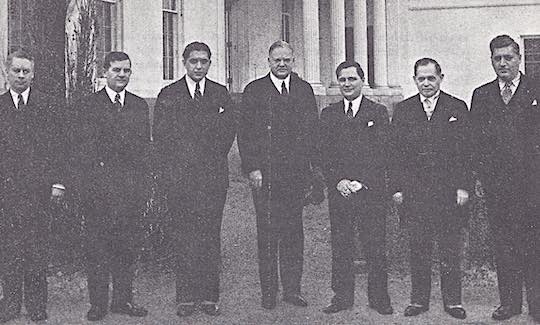
1932 - WHITE HOUSE VISIT
C. R. Nixon, Andrew Jarvis, Harris J. Booras, President Herbert Hoover, Achilles Catsonis, Soterios Nicholson, Peter G. Sikokis.
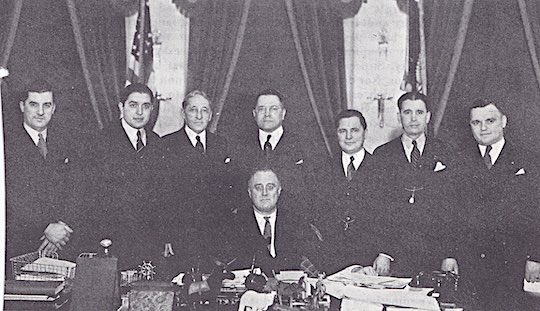
1934 - WHITE HOUSE VISIT
Standing behind President Franklin D. Roosevelt, at his desk: George C. Vournas, Harris J. Booras, U. S. Senator William King (Utah), P. S. Marthakis, Achilles Catsonis, George L. Pappas, Robert Katson, Chris E. Athas
Page 290
(Continued from page 288)
Governor Paul V. McNutt of Indiana became a member of Ahepa at an official function on May 21, 1933 … George Zaharias (Theodosius Vitoyanis) member of the Pueblo, Colorado Ahepa chapter, reached national prominence in heavyweight wrestling … Long Beach and San Pedro, California Ahepa chapters give aid to California earthquake victims … Battle Creek, Michigan initiated State Senator Culp and Judge Shaffer into the chapter … Calgary, Canada Ahepa Chapter boasted that its Greek community was 100% Ahepan … Reno, Nevada Chapter took first honors in the city Admission Day parade with its float "The Parthenon." ... Ahepa observed the 100th anniversary of the death of Adamantios Koraes, the "father of modern Greek literature," on April 6, 1933.
The Reading, Pennsylvania Times of July 10, 1933 editorialized:
In these days when nations, like some individuals, are fitfully seized with megalomania and ostentatiously proclaim their superiority 'uber alles,' it is a privilege to extend cordial greetings and a hearty welcome to descendants of immortal Greece who come here as delegates of the American Hellenic Educational Progressive Association. They help to keep things rational. We have been hearing rather noisily of late of the supremacy of Aryan Nordics. Rather obtrusively has been flung before us the tokens, symbols, and flags of the higher civilization of Wotan. But history makes hash out of mere clap-trap. Aryan Nordics have contributed much to our-not-too-highly-vaunted civilization. But has any race, group, clan, nationality contributed more richly than have the Hellenes? Long before any Aryan Nordic could read or write, Greece had given the world philosophy and art as yet unsurpassed in brilliancy, though twenty centuries have passed. Psychoanalysts tell us that it is really an inferiority complex which manifests itself in exaggerated claims of superiority. Superior people do not carry brass bands to proclaim their genius. Nor does it need bayonets and cannon to make the world look with high esteem upon Socrates and Plato, Aristotle, Phidias, Pericles, Aeschylus, Sophocles, Euripides, Thucydides, Demosthenes.
The world recognizes the superiority of these Greeks -- the immortality of their architecture, sculpture, drama, literature, philosophy recognizes their genius because genius leaves its heritage unmistakably. Superiority and genius are not made by arbitrary edict. In a world sometimes gone mad with superiority complexes, let us play hosts to the Ahepans cheerfully. They help balance our reason. Helping to recall to us the 'golden age' of Greek civilization. They exert a chastening influence upon those of us who have run riot with self-adulation. The superiority complex flattens out beside real giants in civilization. Welcome, Ahepans.
The Sante Fe New Mexican, of June 7, 1933 also editorialized:
We sometimes get cynical about the land of the free and the home of the brave, its politics, its economic injustices, its corruption in high places, its racketeering, and its crime. It gives us a jolt when a group of foreign-extraction citizens, as happened here Monday night, do fervent and highly emotional homage to the flag and the government of America; and proclaim that they have organized thousands of their brothers for the single purpose of making them better and more patriotic and law-abiding citizens of the United States.
Page 291
It bids us pause when we learn that half of the entire Greek male population of this country bore arms for the United States in the World War (I). And to know how they weave the golden age of Greece, Salamis and Thermopylae and a hundred ageless names of heroes, with Washington and Lincoln and the Argonne Forest into a fabric of militant Americanism is one of the most inspiring of all nationalistic experiences. Some Anglo-Saxons were a trifle shamefaced at the banquet of the Order of Ahepa at La Fonda Monday night. Do we know more about America, are we more sophisticated and less naive than these children of the Acropolis or have they a racial experience which gives them a better perspective on the comparative blessings of government? Have we spent too much time looking at "the dust and the cracks on the floor of the temple" and forgotten to look upward to its glory? The greatness of America, says the chief of the Order of Ahepa, 'has not even been conceived.' Perhaps some of the rest of us might well organize to study and master the art of becoming better citizens, and to learn to be as unselfconscious about it as these men of Hellenic forebears who see it simply.
The Winnipeg, Manitoba, Canada Tribune of June 24, 1933, carried a full page illustrated article about the Ahepans of Manitoba, Canada:
It is a far cry from Athens, the queen city of Europe's Near East, to Winnipeg, metropolis of Western Canada, and from Greece, treasure house of art and literature when the world was young, with a culture unsurpassed by any of her contemporaries, to this great Dominion, land of the present and of the future, whose zenith of development is yet to be reached. The men of Greece brought their nation to the peak in the days when Homer sang; today, in other, newer lands they are working with the zeal and the ability of their ancestors, again developing, laboring, good citizens ever, worthy to be counted with the best. When the history of Greece opened, many years before the birth of Christ, that land was known as Hellas and the people were called Hellenes. This name is perpetuated today.
Greeks who have settled in Winnipeg have their Ahepa (American Hellenic Educational Progressive Association) whose name joins in euphonious combination the great Empire of which Canada forms a proud part, and the ancient race from which Ahepa's members spring. The origin of the name Hellenes, or Greeks, forms the basis of one of the most interesting of the early Greek legends. Zeus, "father of gods and men," brought about a great flood to destroy mankind, but Deucalion and Pyrra, who had been forewarned, survived the catastrophe. To repeople the earth they were commanded to throw stones behind them, and for each stone Deucalion threw there sprang up a son, and for each stone Pyrra threw, a daughter. One of the sons was called Hellen, and it is from him that the people of Greece, the Hellenes, are descended.
Page 292
Though not numbered with the largest racial groups in the city or province, a local authority places the number of Greeks in Manitoba at not more than 300 families, they are among the most useful and are doing their full share to promote the best interests of the communities in which they live. Canadians of Greek descent were well represented in the fighting units of the Empire in the Great War. Inscribed on the roll of Glorious Dead, which all Winnipeg honors, is the name of P. T. Kapatos, a Greek veteran, who having borne arms in the wars of his own country, came to Canada shortly before the outbreak of the Great War, enlisted in an early contingent and met his death on the field of battle. While they have made commendable progress in business or whatever they set themselves to do, the Greeks of Winnipeg are a social group, and in Ahepa have an organization which hands them together, perpetuating the ideals and maxims of the Old Land and adapting these to service for the new. The Winnipeg Chapter of Ahepa has some 150 members. A chapter in Brandon is flourishing with 75 and the principles of that Order are practiced to make its members better men and better citizens. Winnipeg is proud of her residents of Greek birth and descent. Quietly, unostentatiously, they are playing their part and making a notable contribution to the progress and development of this city and province. Worthily, they are carrying on the best ideals of one of the earliest civilizations of the Old World.
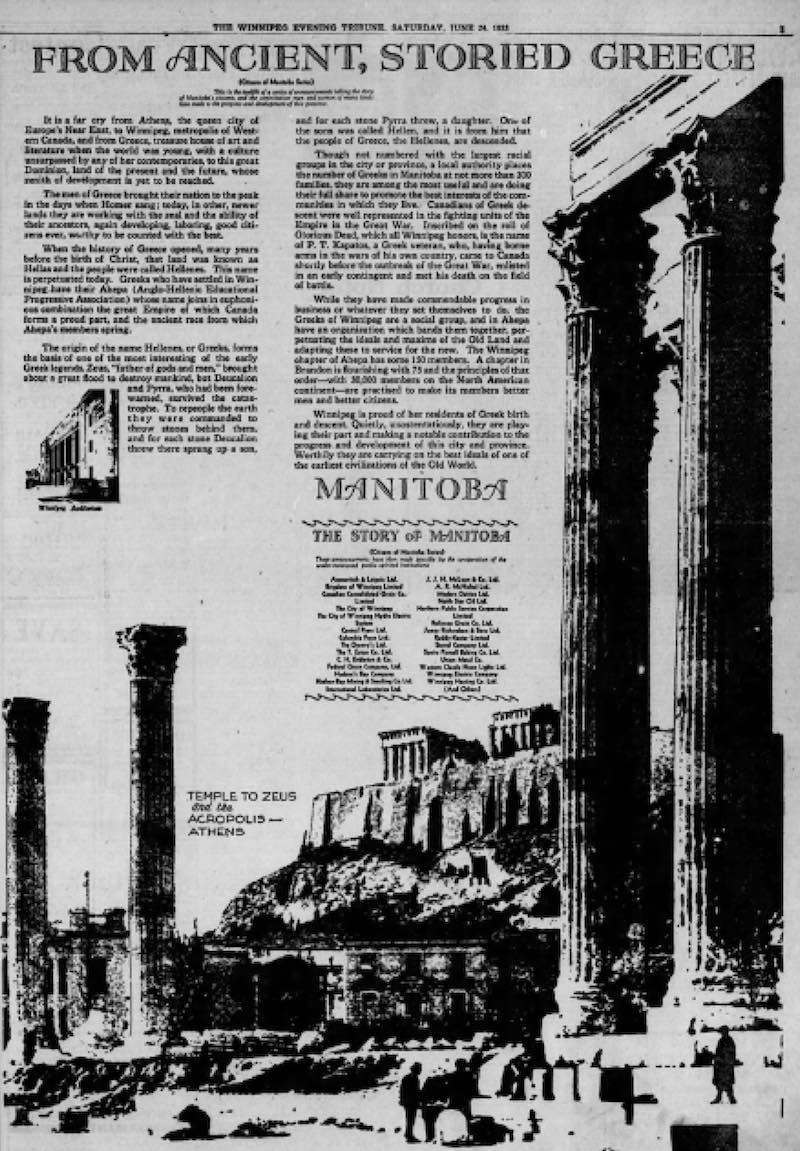
"From Ancient, Storied Greece" (Winnipeg Tribune - June 24, 1933)
An earthquake struck the Island of Kos in late April, 1933, and the Supreme Lodge sent $1,066.00 for relief … . Governor Harry H. Woodring, of Kansas, member of Ahepa, married Helen Coolidge, daughter of President Coolidge.
The Hellenic Institute at Pomfret, Connecticut opened in 1933, an estate purchased by the Greek Archdiocese of North and South America, under the direction of His Eminence Archbishop Athenagoras. The Order of Ahepa, through the Supreme Lodge and its Chapters, contributed more than $10,000 towards the purchase. Within a short while, the school was renamed the Theological School of Pomfret, and became the Greek Orthodox Church's first theological School in America.
Marie Demestichas was elected Queen of the University of Pittsburgh … . Miss Jane Addams of Hull House, Chicago, lectured to 400 Ahepans at a meeting sponsored by Ahepa Chapter No. 46 of Chicago on the subject "Some Social Results of the Depression." Her internationally famous social settlement gave new inspiration and comfort and help to thousands of Chicago immigrants over a period of 40 years.
… Governor John G. Pollard of Virginia was main speaker at the District Convention held at Hopewell, Va … . President Louis Constant of the Lexington, Kentucky, chapter was guest speaker at the Rotary Club meeting … . The Hon. Samuel C. Cleland of Fort Wayne, Indiana, said, in speaking before the Fort Wayne Ahepa Chapter:
Ahepans have demonstrated that they not only preach but practice the golden rule. They have not allowed an opportunity to go by without rendering some substantial aid to persons in need. They are particularly to be commended for their efforts to take care of their own needy cases rather than to enlist the help of public charity. This trait of self-dependence is one which is as old as the race.
Page 293
… Ahepan Jim Londos, heavyweight wrestling champion, attended the Wichita, Kansas Ahepa meeting, following which the entire Chapter went to the Forum to watch Brother Jim win again.
Past Supreme Treasurer John Govatos of Wilmington, Del., was appointed by Delaware Governor Buck to a Commission to supervise the survey of county government and taxation … . The Supreme Lodge awarded Ahepa Scholarships to the following on Oct. 4, 1933:
Leonidas Alaoglou, Edmonton, Canada; Anthony Andrutsopoulos, Canton, Ohio; Theodore Antonakos, High Point, N.C.; James Argyres, Oakland, Cal.; Nick Capos, Seattle; Nicholas G. Chaltas, Buffalo; George Chatalas, Seattle; Matthew Eli Chotas, Atlanta; Harry L. Courounis, Nashua; Bob N. Fassoulis, Syracuse; A. J. Georgacopoulos, Milwaukee; Christy Hanas, New Haven; Gregory C. Hoot, Newport, R.I.; Vasilios S. Lambros, Washington, D.C.; John C. Liliopoulos, Manchester; Dennis J. Livadas, Utica, N.Y.; Peter A. Machinis, Chicago; George L. Mihos, Brockton, Mass.; Peter Mousolite, Cedar Rapids; Harry G. Nickles, Philadelphia; Platonia E. Papps, Detroit; Peter V. Paulus, Canton; Harry S. Perdikis, Lawrence, Mass.; George J. Pohas, Salem, Mass.; Theodore G. Psilolihnos, Chicago; Spiros P. Sarris, Lowell; Harry Sembekos, Washington, D.C.; Arthur G. Skandalis, Lowell; George A. Sotiriou, Chicopee, Mass.; Chris D. Tsoulos, Chicago; Steve Very, Rutland, Vt.; Leo E. Ypsilanti, New York City
The Ahepa objected to certain parts of a movie "The Bureau of Missing Persons" which were objectionable to those of Greek descent, and Warner Brothers Pictures removed those sections from the movie.
Colonel James A. Moss, President General of the U.S. Flag Association said of the Ahepa:
The aims of the Ahepa are indeed, lofty and pattriotic, and the splendid work the organization is doing is most commendable. In some respects, the aims of the Ahepa are basically the same as those of the United States Flag Association, and I, therefore, wish to say that if our Association can in any way serve the Ahepa, please do not hesitate to command us.
… Chris J. Agrofiotis, of the Manchester, N.H. Ahepa Chapter, served as director of the office on Americanism of the New Hampshire Department of the American Legion, and also on the committee for American Education Week … . The Marlboro, Mass. Sons of Pericles Chapter won four prize cups and a cash donation in competition by their Drum Corps of 32 members … . Governor James Rolph, Jr., of California, and Mayor Angelo J. Rossi of San Francisco became members of San Francisco AHEPA Chapter No. 150 … . Dan Kostopulos of Salt Lake City, Utah gave 150 baskets for needy families during Thanksgiving, for the fifth year in succession … . Gus Mitchell of Santa Fe, N. Mex., donated the entire day's receipts of his waffle shop for the needy of the city, and his employees donated their day's pay … . T. J. Thomas of Durham, N.C. was elected Eminent Commander of the Masonic Temple … . Louis J. Gochis, member of Wichita, Kansas chapter, elected President of the Arkansas City Kiwanis Club … . and John Apostal of the same Chapter was Vice President of the Eagles Lodge … . Past President Frank C. DePierre of St. Paul was elected Commander of the American Legion Post #8.
Page 294
The Sixth Ahepa Easter Excursion to Greece arrived in Greece in March, 1934 under the command of Supreme President Harris J. Booras, Supreme Treasurer George L. Pappas and Supreme Governor Chris E. Athas. One of the highlights of the Excursion was the visit of the excursionists to the Ahepa Agricultural School, at Velos, Corinth, on March 31, when the school was dedicated by Prime Minister Panayotis Tsaldaris, with members of his cabinet, and American Minister Lincoln Mac Veagh. More than 20,000 local citizens attended the ceremonies.
John Maktos was appointed assistant to the Solicitor of the United States in 1930, and in 1934 was a representative of the United States at the International Conference in Constantinople. He was born in Greece, graduated from Harvard Law School, and also studied at Oxford University, and at the Sorbonne. He served as a legal advisor to the U.S. State Department … . The Grand Island, Nebraska Rotary Club publication eulogized the character of Gus Poullos of Grand Island, cigar store and shoeshine parlor owner, who died at 34 years of age, and who was the friend of all within the city. "Gus Poullos would have been astonished had he been told the esteem in which the community held him. Little boys shed tears when they heard they had lost their friend." … In an address before the Vancouver, Canada chapter, Chief Justice Auley Morrison of the Supreme Court of British Columbia stated that during his 30 years of judicial duties not a person of Greek origin had appeared before him charged with criminal offense … . Mason City, Iowa Ahepa Chapter erected a monument in their city to the Spirit of the American Doughboy, and presented it to the people of Cerro Gordo County, Iowa … . Michigan Secretary of State Frank D. Fitzgerald joins the Lansing, Michigan AHEPA chapter.
© Copyright Order of AHEPA
George J. Leber's book is copyright protected. However, any portions of this book may be quoted at length, provided that proper credit & acknowledgement is given to the book, author, publisher, and pages.
Citation
Leber, George J. History of the Order of AHEPA 1922 - 1972. Washigton DC, Order of AHEPA, 1972.
